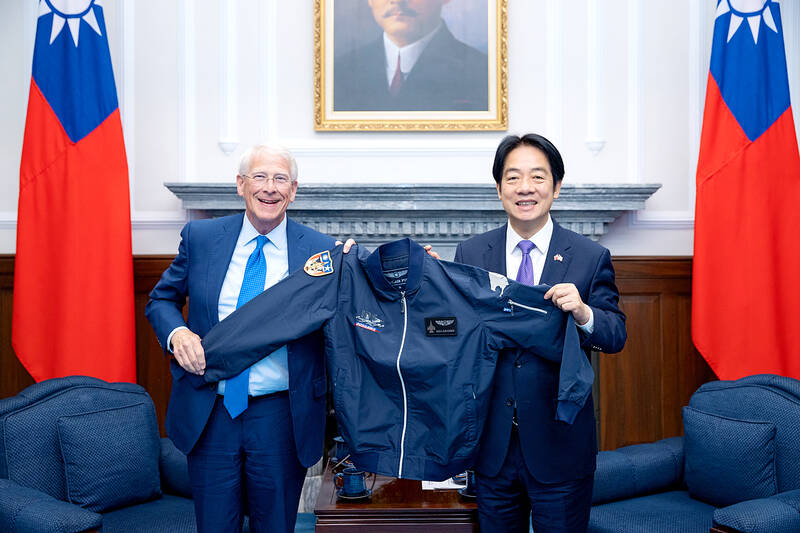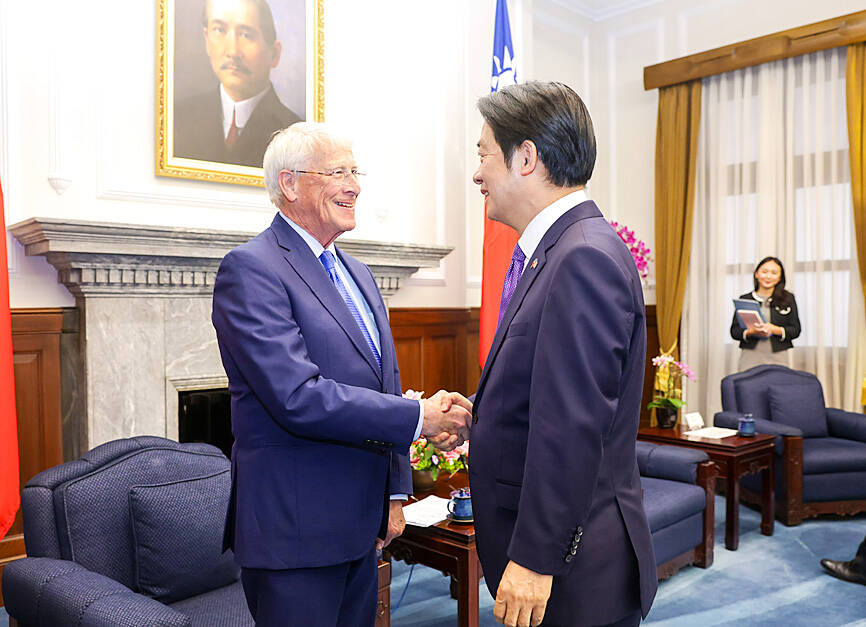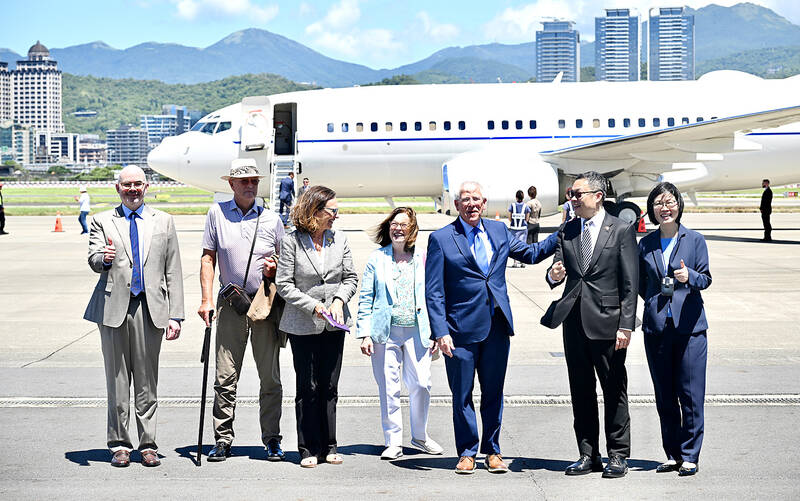Two visiting US senators yesterday pledged to strengthen deterrence against what they described as the “axis of aggression” led by China, in a rare news conference held at the Presidential Office in Taipei.
“There is an axis of aggression that threatens the freedom of many people around the world,” US Senator Roger Wicker, who chairs the US Senate Committee on Armed Services, said shortly after a meeting with President William Lai (賴清德).
The Republican lawmaker and vocal supporter of Taiwan was specifically referring to China, Russia, North Korea and Iran, whose leaders are reportedly gathering in Beijing next week for a military parade marking the end of World War II after Japan’s surrender.

Photo: EPA / Liu Shu Fu/Presidential Office
Wicker emphasized the need for the US and its allies to build up deterrence against China, which he described as “the pacing threat,” adding that the US-led camp “are faced with the most dangerous security moment since World War II.”
“War has come when we let our guard down, when we thought that peace would always remain, and [when] we did not pay attention to mounting threats,” he added.
Wicker said he wished to reaffirm to Taiwan “our determination to remain the best of friends and to defend the freedom of everyone and both of our great countries.”

Photo: CNA
“It is our determination and our intention that Taiwan remain free and make its own decisions,” Wicker said.
US Senator Deb Fischer, who sits on the same committee, said that Washington and Taipei must “invest wisely to strengthen deterrence and to ensure that our defenses are prepared for the threats of tomorrow.”
Neither Wicker nor Fischer specified what sort of efforts are needed to more effectively deter China, other than citing enhanced cooperation between militaries and defense industries.

Photo: Lo Pei-de, Taipei Times
“The importance of deterrence is to be able to have friends, partners [and] allies around the world who work together” to take on “aggressive [and] belligerent” nations, Fischer said.
“A stronger Taiwan means a stronger United States, and vice versa,” she added, calling Beijing’s increasing military threats and political pressure on Taiwan “unacceptable.”
The two senators, who arrived in Taiwan earlier yesterday for a two-day trip, did not disclose details of their meeting with Lai, saying only that the conversation was “meaningful” and “productive.”
Their Taiwan visit is part of a wider regional tour that also includes stops in Hawaii, Guam, Palau and the Philippines.
During the meeting, Lai emphasized his administration’s commitment to strengthening asymmetric capabilities through arms purchases from the US and domestically developed defense programs. He also called for joint research-and-development (R&D) projects to help narrow the military imbalance across the Taiwan Strait.
China’s state media reported that the country’s defense budget this year is an estimated US$249 billion, more than 10 times Taiwan’s.
However, Lai said that Taiwanese remain resolute in defending their nation.
“We will not allow any encroachment on, or annexation of, our sovereignty,” he said.
Additional reporting by AFP

CROSS-STRAIT COLLABORATION: The new KMT chairwoman expressed interest in meeting the Chinese president from the start, but she’ll have to pay to get in Beijing allegedly agreed to let Chinese Nationalist Party (KMT) Chairwoman Cheng Li-wun (鄭麗文) meet with Chinese President Xi Jinping (習近平) around the Lunar New Year holiday next year on three conditions, including that the KMT block Taiwan’s arms purchases, a source said yesterday. Cheng has expressed interest in meeting Xi since she won the KMT’s chairmanship election in October. A source, speaking on condition of anonymity, said a consensus on a meeting was allegedly reached after two KMT vice chairmen visited China’s Taiwan Affairs Office Director Song Tao (宋濤) in China last month. Beijing allegedly gave the KMT three conditions it had to

STAYING ALERT: China this week deployed its largest maritime show of force to date in the region, prompting concern in Taipei and Tokyo, which Beijing has brushed off Deterring conflict over Taiwan is a priority, the White House said in its National Security Strategy published yesterday, which also called on Japan and South Korea to increase their defense spending to help protect the first island chain. Taiwan is strategically positioned between Northeast and Southeast Asia, and provides direct access to the second island chain, with one-third of global shipping passing through the South China Sea, the report said. Given the implications for the US economy, along with Taiwan’s dominance in semiconductors, “deterring a conflict over Taiwan, ideally by preserving military overmatch, is a priority,” it said. However, the strategy also reiterated

‘BALANCE OF POWER’: Hegseth said that the US did not want to ‘strangle’ China, but to ensure that none of Washington’s allies would be vulnerable to military aggression Washington has no intention of changing the “status quo” in the Taiwan Strait, US Secretary of Defense Pete Hegseth said on Saturday, adding that one of the US military’s main priorities is to deter China “through strength, not through confrontation.” Speaking at the annual Reagan National Defense Forum in Simi Valley, California, Hegseth outlined the US Department of Defense’s priorities under US President Donald Trump. “First, defending the US homeland and our hemisphere. Second, deterring China through strength, not confrontation. Third, increased burden sharing for us, allies and partners. And fourth, supercharging the US defense industrial base,” he said. US-China relations under

The Chien Feng IV (勁蜂, Mighty Hornet) loitering munition is on track to enter flight tests next month in connection with potential adoption by Taiwanese and US armed forces, a government source said yesterday. The kamikaze drone, which boasts a range of 1,000km, debuted at the Taipei Aerospace and Defense Technology Exhibition in September, the official said on condition of anonymity. The Chungshan Institute of Science and Technology and US-based Kratos Defense jointly developed the platform by leveraging the engine and airframe of the latter’s MQM-178 Firejet target drone, they said. The uncrewed aerial vehicle is designed to utilize an artificial intelligence computer